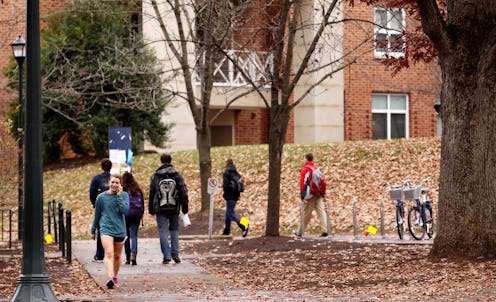News
Some UVA Frats Are Saying "No" To New Policy
Spring semester has just started for college students across the country, and the fallout from the Rolling Stone story continues. Two fraternities at the University of Virginia have refused to sign a new university policy that would add stricter guidelines to Greek nightlife. The new UVA policy is aimed mostly at fraternities, following the November expose piece by Rolling Stone that shone a light on the university's alleged mishandling of on-campus rape and sexual assault — except the magazine's story, as it turned out, might not have been entirely truthful.
ABC News reports that Alpha Tau Omega and Kappa Alpha Order are not signing the Fraternity Operating Agreement, which UVA President Teresa A. Sullivan introduced just last week. As you may recall, Sullivan suspended all Greek social activities on Nov. 22, as the school administration opened an investigation into the allegations made in the Rolling Stone piece.
A criminal investigation was also opened into the Phi Kappa Psi fraternity, which was where Rolling Stone journalist Sabrina Rubin Erdely said an alleged gang rape occurred in 2012. However, the frat was recently cleared of any wrongdoing. (The facts of the story, including the gang rape and Phi Kappa Psi's involvement, were later disputed in a report from The Washington Post.)
Sullivan promised in November that Greek social activities could return on Jan. 9, and she upheld her word. Fraternities can resume their activities this semester — but only if they sign the Fraternity Operating Agreement.
In a joint statement released on Wednesday, Alpha Tau Omega and Kappa Alpha Order claimed their organizations were wrongfully punished last November. It was even more damaging, because parts of the Rolling Stone were untrue, the two fraternities said:
The University violated the previous FOA as well as student individual and organizational rights. The system-wide suspension, which was initiated for reasons that were found to be untrue, unfairly punished all members of fraternities and sororities.
Their statement continued:
It was maintained and used as leverage to require the changes to the FOA. Because we do not accept the validity of a suspension imposed in contravention of the existing FOA, university policy, Virginia law and the constitutional rights of our members, we are not compelled to sign a revised FOA to continue operations on campus.
What makes the new policy, which has to signed by sororities as well as fraternities by Jan. 16, so controversial? The new addenda introduces some tougher rules about when and how fraternities can have parties at their houses. For instance, all "fraternity functions" must now have at least three "sober brother monitors," who will stand guard throughout the part and at the stairs leading to residential rooms. An additional sober monitor must be added to the function every 30 minutes.
Hard alcohol will be prohibited from "tier 1" events (the larger functions), and beer must now be served in the original, unopened cans. Hard liquor can only be served at "tier 2" events if the bottles are placed at a "central bar."
The policy mandates that a security guard, provided by the Inter-Fraternity Council, must be placed at the entry of every function. One sober brother monitor will also have a master key to every residential room in the house, just in case.
Here's a section of the addenda:
Although Alpha Tau Omega and Kappa Alpha Order have rejected the agreement, other UVA fraternities seem OK with the new rules. Inter-Fraternity Council President Tommy Reid said Wednesday in a statement:
Student fraternity members, fraternity chapter presidents, the IFC Governing Board, a multitude of student groups at U.Va, including One in Four and the other three Greek councils, the Fraternity Alumni Council, scores of individual alumni and many more have worked around the clock for the past month and half to develop these improvements to our system. The IFC is excited for the spring semester and looks forward to continuing to lead the advancement of student safety at the University.
Julia Pedrick, president of UVA's Inter-Sorority Council, added in a statement that the organization's "safety recommendations represent what we believe to be the best ways to better ensure the well-being of our fellow members."
Images: Getty Images
